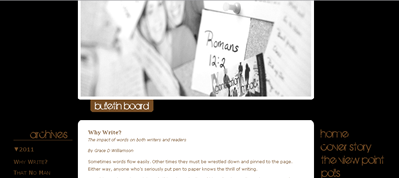One of my favorite poems is one by Matthew Arnold called Morality. I don’t remember where I first heard or read it, but the first stanza has been etched in my mind for years:
We cannot kindle when we willThe fire which in the heart resides;The spirit bloweth and is still,In mystery our soul abides.But tasks in hours of insight will’dCan be through hours of gloom fulfill’d.



 A couple of months ago I was contacted by
A couple of months ago I was contacted by  In my
In my  Let me give a specific illustration. One of my piano students is very expressive and loves to incorporate lots of impulsive nuances into his playing. The only problem is that the nuances distort the natural flow of the phrases and result in inaccurate rhythms. As his teacher, I visualize for him an end result of musical and artistic piano playing that will be lovely to listen to (which is also what he wants). However, I know that the elements that contribute to this include: precise execution of rhythmic values, natural ebb and flow of the phrasing, well-chosen fingering, and fluidity. So I pick one of these elements, in this case the phrasing. We work to understand the principles that govern phrasing – musical phrases tend to swell in volume as the notes rise and decrease in volume as the notes descend. Random notes should not be accented at will because this interrupts the flow of the phrase. Once this principle is understood, we reinforce it by applying it to all the musical assignments that week. Following weeks lend themselves to other areas of understanding and emphasis.
Let me give a specific illustration. One of my piano students is very expressive and loves to incorporate lots of impulsive nuances into his playing. The only problem is that the nuances distort the natural flow of the phrases and result in inaccurate rhythms. As his teacher, I visualize for him an end result of musical and artistic piano playing that will be lovely to listen to (which is also what he wants). However, I know that the elements that contribute to this include: precise execution of rhythmic values, natural ebb and flow of the phrasing, well-chosen fingering, and fluidity. So I pick one of these elements, in this case the phrasing. We work to understand the principles that govern phrasing – musical phrases tend to swell in volume as the notes rise and decrease in volume as the notes descend. Random notes should not be accented at will because this interrupts the flow of the phrase. Once this principle is understood, we reinforce it by applying it to all the musical assignments that week. Following weeks lend themselves to other areas of understanding and emphasis.